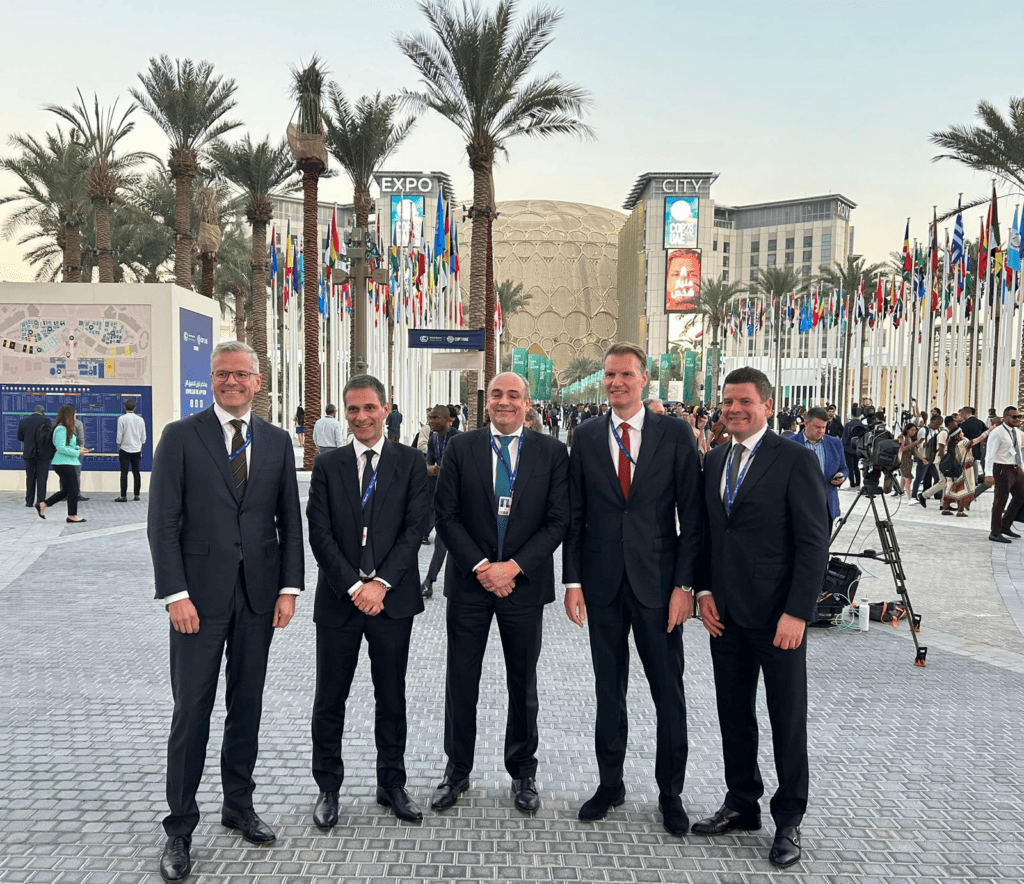Top Maritime CEOs Go All-In on Decarbonization Efforts

Top executives from major global shipping lines have come together in a united move, urging the International Maritime Organization (IMO) to set an end date for fossil fuel-only newbuilds. A collaboration of global shipping leaders presented a joint declaration last week at COP28 (taking place in Dubai through December 12) aiming to accelerate the adoption of green fuels and establish regulatory measures to push for the industry’s transition to a more sustainable future.
Pointing to escalating global temperatures and increasing climate-related challenges, while noting that the shipping industry accounts for 2-3% of global greenhouse gas (GHG) emissions, the CEOs underscored the urgency of meeting IMO’s greenhouse gas-reduction targets for 2030, 2040, and net-zero emissions by 2050. They stated that transitioning from fossil to green fuels at scale and pace is the most feasible route to achieve these ambitious goals. The CEOs, representing frontrunners in introducing lower GHG emission ships, highlighted a desire for closer collaboration with IMO regulators.
Their joint declaration outlines four key regulatory cornerstones necessary for effective and concrete policy measures:
- End Date for Fossil Fuel-Only Vessels: A timeline for phasing out new fossil fuel-only vessels and implementing a GHG Intensity Standard to inspire investment confidence in new ships and the necessary fuel supply infrastructure.
- Effective GHG Pricing Mechanism: Ensuring competitiveness of green fuels during the transition phase, with a mechanism distributing the green fuel premium across all fossil fuel usage and incentivizing deeper emissions reductions.
- Vessel Pooling Option: Allowing compliance with GHG regulations based on the performance of groups of vessels rather than individual ships to accelerate decarbonization across the global fleet.
- Lifecycle GHG Regulatory Basis: Aligning investment decisions with climate goals and mitigating the risk of stranded assets.
Expressing a shared conviction, the industry leaders emphasized their support for regulation aimed at mitigating the cost of the green transition. They anticipate broader industry participation and support, citing a belief that the cost of climate change outweighs the transition costs.
Commenting on this noteworthy collaboration, CEOs from major shipping companies echoed their commitment to collective action:
- Rodolphe Saadé, CMA CGM Group: Stressed the importance of collaboration and collective commitment towards achieving ambitious decarbonization milestones.
- Vincent Clerc, A.P. Moller – Maersk: Emphasized the necessity of efficient regulatory conditions to drive maximum GHG emission reductions.
- Rolf Habben Jansen, Hapag-Lloyd: Reiterated the commitment to advancing maritime decarbonization through clear targets and a regulatory framework.
- Soren Toft, MSC Mediterranean Shipping Company: Highlighted the need for concrete measures and global support for alternative fuels to achieve net-zero emissions.
- Lasse Kristoffersen, Wallenius Wilhelmsen: Underlined the industry’s proactive role in supporting net-zero ambitions and called for a global regulatory framework to align with these objectives.
This unified initiative signals a striking willingness to enact changes aimed at driving a more sustainable shipping industry, and elevating global decarbonization efforts.
